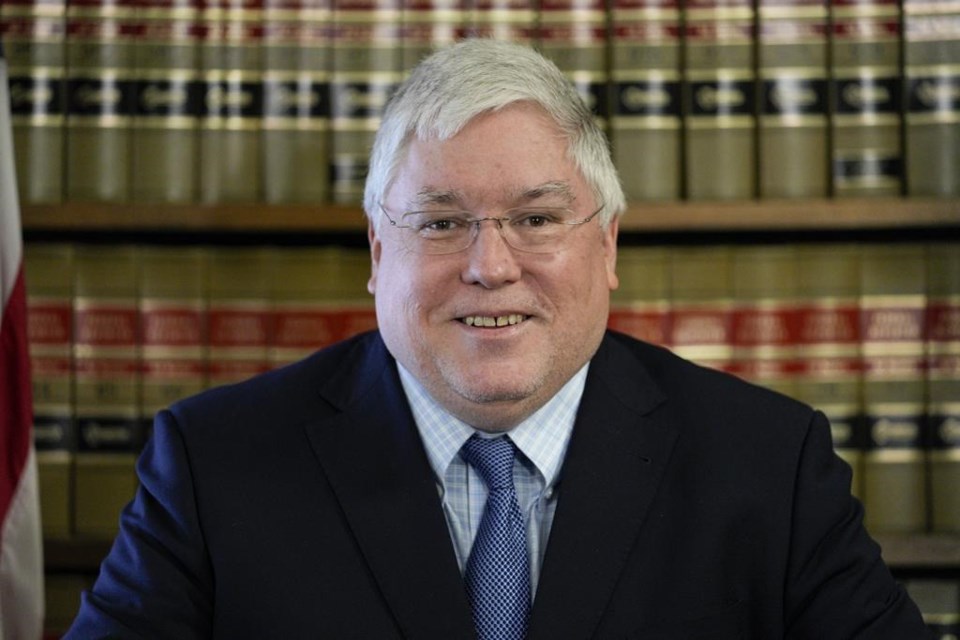CHARLESTON, W.Va. (AP) — West Virginia's transgender sports ban violates the rights of a teen athlete under Title IX, the federal civil rights law that prohibits sex-based discrimination in schools, an appeals court ruled Tuesday.
The 4th U.S. Circuit Court of Appeals ruled 2-1 that the law cannot be applied to a 13-year-old who has been taking puberty-blocking medication and publicly identified as a girl since she was in the third grade.
In February 2023, the court had blocked the state's bid to kick Becky Pepper Jackson off her middle school cross country and track and field teams if the law were enforced.
Judge Toby Heytens wrote that offering her a “choice” between not participating in sports and participating only on boys teams “is no real choice at all.”
“The defendants cannot expect that B.P.J. will countermand her social transition, her medical treatment, and all the work she has done with her schools, teachers, and coaches for nearly half her life by introducing herself to teammates, coaches, and even opponents as a boy,” Heytens wrote.
The court ruled in favor of the American Civil Liberties Union, its West Virginia chapter and LGBTQ interest group Lambda Legal. They sued the state, county boards of education and their superintendents in 2021 after Republican Gov. Jim Justice signed the bill into law.
“This is a tremendous victory for our client, transgender West Virginians, and the freedom of all youth to play as who they are,” ACLU West Virginia attorney Joshua Block said in a statement.
The court noted that Jackson has been living as a girl for over five years and changed her name, and the state of West Virginia has issued her a birth certificate listing her as female. The court said she takes puberty-blocking medication and estrogen hormone therapy. Starting in elementary school, she has participated only on girls’ athletic teams.
“B.P.J. has shown that applying the act to her would treat her worse than people to whom she is similarly situated, deprive her of any meaningful athletic opportunities, and do so on the basis of sex. That is all Title IX requires,” Heytens wrote.
While the ruling makes clear that the law is discriminatory, ACLU-West Virginia spokesperson Billy Wolfe said in a statement, “as far as we know, our client is the only child currently impacted by this law. If others find themselves in this situation, we encourage them to contact the ACLU-WV legal team.”
West Virginia Attorney General Patrick Morrisey was “deeply disappointed” in the decision, the Republican said. His office said except for the specific case decided Tuesday, the ban remains in place.
“I will keep fighting to safeguard Title IX. We must keep working to protect women’s sports so that women’s safety is secured and girls have a truly fair playing field,” Morrisey said. “We know the law is correct and will use every available tool to defend it.”
In January 2023, a federal judge dissolved a preliminary injunction that was granted in July 2021. The judge also ruled the state's transgender law did not violate Title IX.
The appeals court noted it did not find that government officials are barred from establishing separate sports teams for boys and girls or that they lacked authority to police the line drawn between those teams.
“We also do not hold that Title IX requires schools to allow every transgender girl to play on girls teams, regardless of whether they have gone through puberty and experienced elevated levels of circulating testosterone,” the court wrote. "We hold only that the district court erred in granting these defendants’ motions for summary judgment in this particular case and in failing to grant summary judgment to B.P.J. on her specific Title IX claim.”
Dissenting Judge G. Steven Agee wrote that the state can separate teams by gender assigned at birth "without running afoul of either the Equal Protection Clause or Title IX.”
Sports participation is one of the main fronts in legislative and legal battles in recent years over the role of transgender people in U.S. public life. Most Republican-controlled states have passed restrictions on participation, as well as bans on gender-affirming health care for minors. Several have also restricted which bathrooms and locker rooms transgender people can use, particularly in schools.
West Virginia is one of at least 24 states with a law on the books barring transgender women and girls from competing in certain women’s or girls sports competitions.
The bans are in effect in Alabama, Arkansas, Florida, Indiana, Iowa, Kansas, Kentucky, Louisiana, Mississippi, Missouri, Montana, North Carolina, North Dakota, Oklahoma, South Carolina, South Dakota, Tennessee, Texas and Wyoming.
In addition to West Virginia, judges have temporarily put enforcement of the bans on hold in Arizona, Idaho and Utah. But the 2nd Circuit revived a challenge last year to Connecticut’s policy of letting transgender girls compete in girls sports, sending it back to a lower court without ruling on its merits.
In a related case, an Ohio judge ruled Tuesday that enforcement will be put on hold for a state law to ban gender-affirming care for minors as well as keep transgender girls out of girls scholastic sports competitions. The law was to take effect on April 24, but is now paused for two weeks, or until there’s a hearing on it. Franklin County Judge Michael Holbrook said in a written opinion that it’s likely that it violates a requirement that state legislation deal with a single subject.
The Biden administration originally planned to release a new federal Title IX rule addressing both campus sexual assault and transgender athletes. Earlier this year, the department decided to split them into separate rules, and the athletics rule now remains in limbo.
___
This story has been corrected to show that the court found the ban discriminated against a teen athlete, but did not overturn it.
___
Associated Press reporters Denise Lavoie in Richmond, Virginia, and Geoff Mulvihill in Cherry Hill, New Jersey, contributed to this report.
John Raby, The Associated Press



